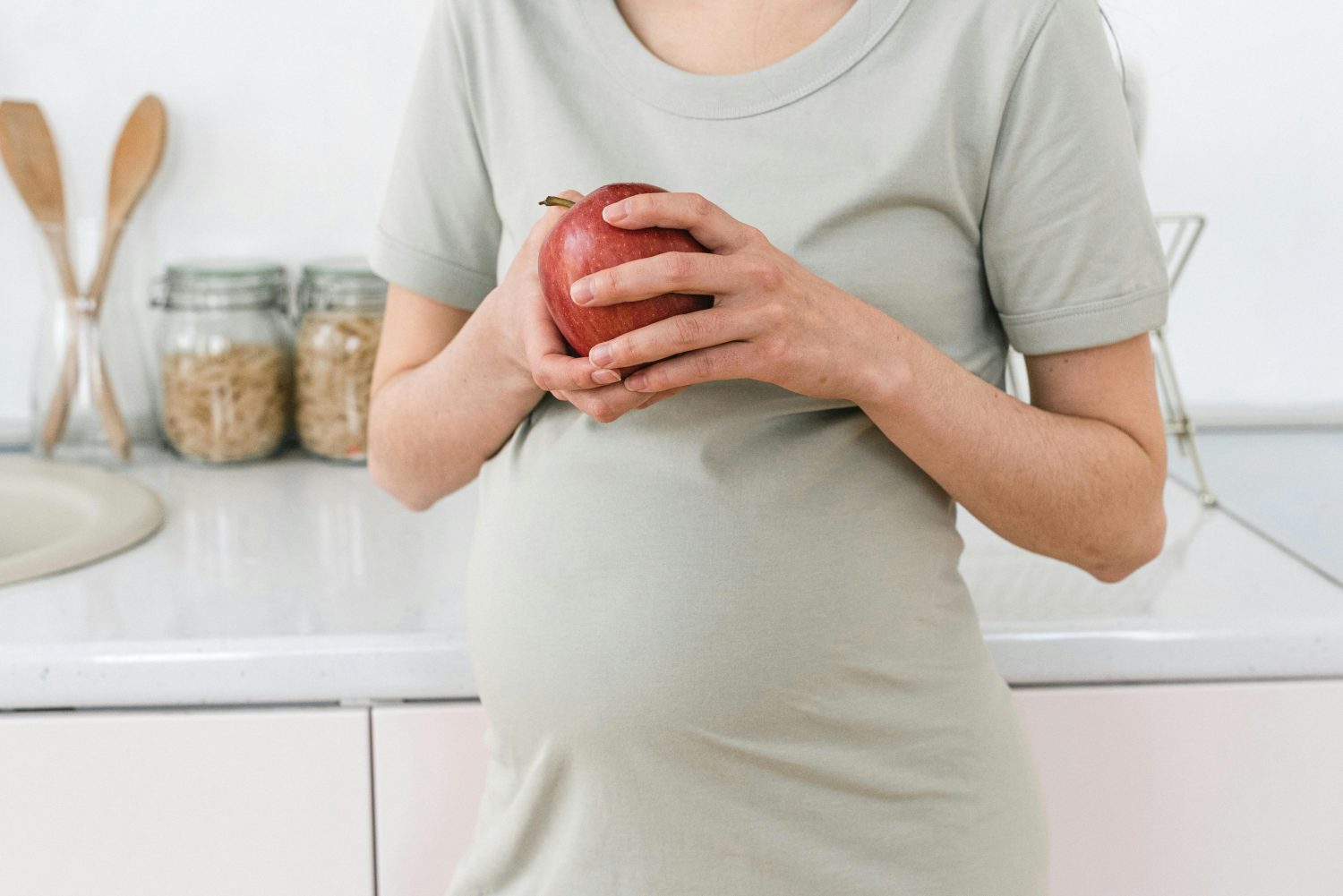Pregnancy vitamins
Pregnancy is an intensive period during which the mother’s body undergoes numerous adaptations to support the baby’s development. Vitamins play a crucial role in this process, as they not only maintain the health of the mother, but also promote the growth and development of the foetus. From strengthening the immune system to supporting cell formation, vitamins play a key role in ensuring that the pregnancy runs smoothly and that the baby is optimally nourished. In this blog post, we’ll take an in-depth look at the importance of vitamins during pregnancy and how they help to promote the health of both mum and baby.
The most important vitamins during pregnancy
During pregnancy, the need for certain nutrients increases to support the healthy development of the baby and maintain the health of the mother. Vitamins play a crucial role in maintaining numerous vital functions in the body. During this time, the need for certain vitamins and minerals increases to meet the growing needs of the developing baby while maintaining the health of the mother. A deficiency of these essential nutrients can have serious consequences, both for the pregnant woman and for the unborn child.
Folic acid plays a crucial role in the development of the baby’s neural tube, especially in the early weeks of pregnancy when the embryo’s spinal cord and brain are forming. Adequate folic acid levels can significantly reduce the risk of neural tube defects such as spina bifida.
Sources: Good sources of folic acid are green leafy vegetables, pulses, wholemeal products, nuts and seeds. As it can be difficult to meet folic acid requirements through diet alone, health experts often recommend taking a folic acid supplement, especially in the first few weeks of pregnancy.
Iron is essential for the formation of red blood cells and the transport of oxygen in the body. During pregnancy, the need for iron increases as the body produces more blood to supply the growing baby with oxygen. An iron deficiency can lead to anaemia, which can have a negative impact on the health of both mother and child.
Role: Iron deficiency can lead to fatigue, weakness, shortness of breath and increased susceptibility to infections. In pregnant women, anaemia can increase the risk of premature birth and low birth weight.
Vitamin D is important for the baby’s bone development and supports the mother’s immune system. It also plays a role in mood regulation and can help prevent pregnancy depression.
Sources: The most important source of vitamin D is sunlight, as the skin synthesises vitamin D when exposed to UV-B rays. In addition, some foods such as oily fish, eggs and fortified foods are good sources of vitamin D.
Omega-3 fatty acids, especially DHA (docosahexaenoic acid), are important for brain and eye development in babies. They also play a role in regulating the mother’s mood and mental health during pregnancy.
Sources: The best sources of omega-3 fatty acids are oily fish such as salmon, mackerel and sardines. Plant sources include flaxseed, chia seeds and walnuts. In some cases, it may also be useful to take omega-3 supplements, especially if your diet is inadequate.

Other important nutrients during pregnancy
Calcium is crucial for the bone health of both mum and baby. During pregnancy, calcium is needed to form the baby’s bones and teeth and to maintain the mother’s bone health.
Sources: Good sources of calcium include dairy products such as milk, cheese and yoghurt, green leafy vegetables such as broccoli and kale, as well as almonds and sesame seeds.
Iodine
Iodine is important for the thyroid function of mother and baby. During pregnancy, iodine plays a crucial role in the development of the baby’s brain and nervous system.
Sources: The most important natural source of iodine is iodised table salt. Seafood such as seaweed and fish are also good sources of iodine.
Vitamin C is known for its role in strengthening the immune system. During pregnancy, a strong immune system is particularly important to protect mother and baby from infections.
Sources: Good sources of vitamin C are citrus fruits such as oranges and lemons, strawberries, kiwis, peppers and broccoli.
It is important to have a balanced diet during pregnancy that is rich in various vitamins and minerals to support the health of both mum and baby. If you have concerns about your diet, talk to your doctor or a nutritionist about taking supplements.
Vitamin deficiency during pregnancy
A lack of essential vitamins during pregnancy can have serious effects on the health of both mother and baby. Here are some of the risks and consequences of vitamin deficiency during pregnancy:
- Folic acid deficiency: a lack of folic acid can increase the risk of neural tube defects in the baby, which can lead to severe developmental problems.
- Iron deficiency: Iron deficiency can lead to anaemia in the mother, which in turn increases the risk of premature birth and low birth weight.
- Vitamin D deficiency: A lack of vitamin D can lead to reduced bone health in the baby and increase the risk of rickets.
- Omega-3 fatty acid deficiency: A lack of omega-3 fatty acids can affect the development of the baby’s brain and eyes and increase the risk of developmental disorders.
- Calcium and iodine deficiency: Calcium and iodine deficiency can also have negative effects on the baby’s bone and brain development.
It is important to have a balanced diet during pregnancy and ensure that you are getting enough of all the essential vitamins and minerals. If you have concerns about possible deficiencies, talk to your doctor about the possibility of supplementation.

Tips for a healthy pregnancy
A healthy diet during pregnancy is crucial for the wellbeing of both mum and baby. Here are some tips to make sure you get all the nutrients you need:
- Eat a balanced diet: Fresh fruit and vegetables provide essential vitamins and minerals, while whole grains provide fibre and long-lasting energy. Lean protein from poultry, fish, beans and tofu supports baby’s growth and development.
- Choose foods rich in nutrients: Green leafy vegetables such as spinach and kale are rich in folic acid and iron. Oranges and strawberries are good sources of vitamin C, while pulses such as beans and lentils are rich in protein and fibre. Oily fish such as salmon and mackerel provide omega-3 fatty acids, which are important for baby’s brain and eye development.
- Pay attention to the quality of your food: opt for fresh, unprocessed foods whenever possible and avoid highly processed foods, which are often high in sugar, salt and unhealthy fats. Choose organic produce to minimise the use of pesticides and other chemicals.
- Drink enough water: Adequate fluid intake is especially important during pregnancy to avoid dehydration and keep the body well-hydrated. Drink at least 8 glasses of water a day and be sure to include hydrating foods such as fruit and vegetables.
- Avoid potentially harmful foods: Certain foods can pose a higher risk of food poisoning or other complications during pregnancy. Avoid raw or undercooked foods such as raw meat, fish, eggs and unpasteurised dairy products, as well as certain types of fish high in mercury such as shark, swordfish and king mackerel.
- Consult your doctor or dietitian: Every pregnancy is unique and your dietary needs may vary depending on your individual circumstances. Therefore, talk to your doctor or a nutritionist about how to ensure optimal nutrition during your pregnancy.
During pregnancy, despite eating a healthy diet, it can be challenging to get all the nutrients you need in sufficient quantities. This can be due to various factors, including individual dietary habits, food intolerances, lack of availability of certain foods or even pregnancy symptoms such as nausea and loss of appetite.
In such cases, nutritional supplements can play an important role in ensuring that both the expectant mother and the growing baby are adequately supplied with all the necessary nutrients. Vitamin supplements during pregnancy, especially those containing folic acid, iron, vitamin D and omega-3 fatty acids, are often recommended to compensate for potential deficiencies and support the health of both mum and baby.
However, it is important not to consider supplements as a substitute for a balanced diet, but as a supplement to it. A varied and nutritious diet remains the best source of all necessary vitamins and minerals during pregnancy. Before taking supplements, it is advisable to speak to your doctor to ensure that they are suitable for your individual situation and to obtain the correct dosage recommendation.
Conclusion
It can be concluded that pregnancy vitamins play an essential role in the health of both mother and child. A balanced diet rich in fresh fruit, vegetables, wholemeal products and lean protein forms the basis for a healthy pregnancy. However, it can be challenging to get all the nutrients you need through diet alone, which is why taking vitamin supplements during pregnancy may be recommended. By combining a healthy diet with supplementary vitamins where necessary, mums-to-be can ensure the best possible support for themselves and their baby.
